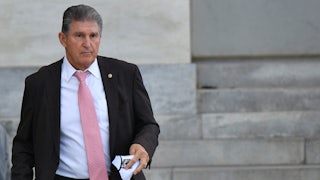It’s been an extraordinary few days for the Select Committee to Investigate the January 6th Attack
on the Capitol. The committee, and Vice Chair Liz Cheney in particular,
have released a trove of new text messages and correspondence showing the lengths to which Donald Trump
and his allies seemed willing to go to reverse the 2020 election
results and allow supporters to violently storm the Capitol, endangering
the lives of Republican and Democratic lawmakers alike, alongside
journalists and Capitol Hill staff. The committee released new information showing that even some of Trump’s most vocal backers in the media and among his staff had serious concerns about what was happening in the lead-up to the Capitol riot.
“The dominant question that the committee has a laser-like focus on is, ‘What was Trump’s exact role in the assault on Congress in the insurrection?’” said Norm Eisen, who was the co-counsel for the House Judiciary Committee during the first impeachment of Donald Trump. “And we’ll know they’re making material progress in ascertaining that because of the wealth of information that has come out in the [Mark] Meadows contempt proceedings.”
But for all the committee has uncovered, there
are now more and bigger questions about what comes next. Here are the top
five, going forward, that the committee must now grapple with.
1. How forcefully did Mark Meadows intercede with Trump?
The disclosed correspondence and text messages paint a somewhat conflicting picture for Meadows. At moments, in response to texts from GOP lawmakers, the former White House chief of staff said he knew he had to push Trump hard to get him to more forcefully denounce the riot or tell people to go home. At the same time, other texts suggest that he was supportive of Trump’s allies looking for “aggressive” or controversial ways to win the 2020 presidential election technically, even though Trump lost. It’s unclear whom Meadows was indulging in fulfilling Trump’s desires, and how much, and to what extent he was trying to be the voice of reason.
2. Who was the lawmaker behind the infamous November 4 text?
In the set of text messages the committee released earlier this week, there is a November 4 text to Meadows from someone the committee will only identify as a member of Congress or “lawmaker.” The text reads, “HERE’s an AGRESSIVE STRATEGY. Why can t the states of GA NC PENN and other R controlled state houses declare this is BS (where conflicts and election not called that night and just send their own electors to vote) and have it go to the SCOTUS.”
The text effectively shows a member of Congress, two days after the election, speculating on ways to undercut the democratic process to keep Trump in power through an avenue that Trump’s allies would dig into—with a PowerPoint presentation, discussions with state lawmakers and pressure on then–Vice President Mike Pence from Trump himself that was ultimately unsuccessful.
Meadows is a former member of the House Freedom Caucus, that band of conservative radicals within the Republican caucus. It’s unclear who the lawmaker in question is, but given the former chief of staff’s ties and ideological alignment to them it might be a member of that caucus. Select committee members, including Cheney, have refrained from identifying the lawmaker. It may not end up having a lot to do with the events of January 6—or it may have been someone who was deeply involved in the events of that day.
3. What else is the committee sitting on?
One thing the January 6 committee members are eager to say is how much material they’re sifting through. They often note they have conducted hundreds of interviews, have thousands of pages of files passed over by people who have been subpoenaed (including Meadows himself before he stopped cooperating with the committee), and have followed up on hundreds of tips. Committee members have repeatedly said they would reveal more as they sift through what they have and better understand the context. Committee Chairman Bennie Thompson on Wednesday tamped down on some speculating by saying on NBC that the number of text messages the committee has is less than a dozen and there wouldn’t be any more “surprises.”
Still, it’s clear from what the committee has released so far that it is gaining a better understanding of the root causes for January 6 and how far Trump and his allies were willing to go to stay in power.
4. Who are the big names who are cooperating?
For all the attention Steve Bannon, Jeffrey Clark, and Mark Meadows continue to receive for defying the committee’s subpoenas, there
are plenty more who are cooperating with the committee in its
investigation. Some of them are well-established Trump campaign or White
House officials: Bill Stepien, Stop the Steal organizer Ali Alexander, Kash Patel,
attorney John Eastman (of Eastman Memo fame now), and former
Cybersecurity and Infrastructure Security Agency Director Chris Krebs have all met with the committee.
Former New York City Police Commissioner Bernie Kerik has been making
noises suggesting he is not actually going to comply with the committee’s
subpoena, but, in fact, through a letter obtained by Politico, the Rudy Giuliani ally is complying with the panel as well.
5. And most of all, what did Donald Trump do—or not do—during those fateful 187 minutes?
This is the big enchilada. We don’t really know. If the committee can produce a report that shows definitely that Trump ignored entreaties to call off the insurrectionists—or, God forbid, that he was enjoying the theater of it, as some accounts have posited—it wouldn’t hurt his 2024 nomination chances, but it could well damage his election prospects.
And OK, a bonus question: Why didn’t Donald Trump Jr. have his dad’s cell phone number?
The former president’s son at one point joined the ranks of conservatives pleading with Meadows—not Trump himself—to get the then president to deliver a forceful address from the Oval Office to turn away the rioters. It’s possible that the younger Trump was also texting with his father directly. But if he were, why would he bother texting the man who was effectively his father’s assistant?
After all, there have been indications, including at times jokes from Junior himself, that Trump’s favorite child is Ivanka. So maybe Don Jr. should have texted her for Dad’s number.








